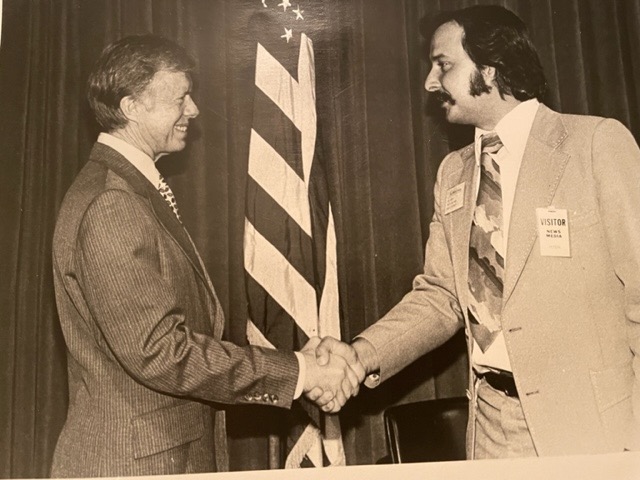By Bill Barth

The 39th President of the United States was smiling on July 27, 1979.
Less than four months later – on Nov. 4, 1979 – the defining moment of Jimmy Carter’s presidency occurred, when Iranian militants seized the U.S. Embassy in Tehran and took 66 Americans hostage. He would go on to lose his bid for a second term in 1980, in no small measure because a majority of Americans concluded Carter failed to meet the Iran challenge.
The hostages were released on January 20, 1981, as Ronald Reagan recited the oath of office to succeed Carter.
Was Carter one of America’s worst presidents? Leave that one to the historians. He had wins, such as the Camp David Accords that made peace between Israel and Egypt. And he had losses besides the Iran affair, such as a stubborn economy that combined sluggish growth with high inflation.
Today, as the 98-year-old ex-president is in hospice end-of-life care, I remember the man I met in the accompanying photograph on that July morning of 1979. Get it over with; laugh at my atrocious suit and tie, the shaggy hair and the Elvis sideburns. Back then, that look sometimes passed for styling.
The moment reflects what Carter tried to bring to the presidency in the fragile years following divisions over Vietnam and the Nixon Watergate scandal. He rejected the “imperial presidency,” and strove to bring humility and humanity to the office.
One strategy Carter used was how I got in the door that day. Concluding that presidents became isolated from the people and overrun with the Washington press corps, Carter decided to reach beyond the capital city by inviting local and regional journalists for sessions at the White House complex. I was shocked one day to receive a personal invitation from the White House press office to join the event.
I would have paid my own way to go, but the paper picked up the tab. Once upon a time, newspapers made a lot of money.
The event itself didn’t break a lot of news. A few dozen journalists from around the country attended. The other Wisconsin colleague was True Farris – what a name for a journalist – then managing editor of the Milwaukee Sentinel. A press office representative explained the ground rules. A couple of Cabinet members spoke briefly and took questions. Then Carter arrived, made remarks, fielded a few questions and set up for pictures.
The most amusing part of the day came when the event ended and we left the building. Members of the White House press corps milled about, looking annoyed, trying to ask us questions about what had happened inside. I remember mumbling, “Read about it in the Beloit Daily News.”
So, what’s the point other than the rambling reminiscences of an aging reporter?
Just this.
Jimmy Carter may not have been a great president, or, for that matter, a particularly good one.
But he was, without a doubt, a good and decent man. Unpretentious. Humble. Respectful of all people. Honest. Open. Wielding authority with grace, and accepting defeat with the same grace.
Some of it may have been for show. Schlepping his own luggage off Air Force One seemed a bit theatrical. In another sense, though, it fit the times. After Watergate and Vietnam, a large swath of the country had lost faith in the country’s leadership. People believed the leaders were egotistical, dark and duplicitous and unworthy of trust. In his very plainness, Carter messaged that he wasn’t so different from anybody else.
He is America’s longest-lived former president, returning to his family home in small-town Plains, Georgia, for more than four decades with his wife, Rosalynn, of 76 years.
Think what you will of Carter as president but, undeniably, he has been America’s greatest ex-president.
He regularly demonstrated his commitment to worldwide peace by feats of quiet diplomacy at the request of his various successors in office. He was awarded the Nobel Peace Prize in 2002.
He traveled extensively to promote fair elections across the globe and advocate for better health care in poor nations.
He became an eloquent spokesman for environmental and climate causes.
He put every other ex-president – and most of the rest of us – to shame by his consistent devotion to charitable causes, particularly Habitat for Humanity where Carter often could be found, hammer in hand, building homes for needy families.
He was a prolific author, producing many books committing his words and beliefs to paper for posterity.
Not surprisingly, Carter was a man of strong faith, teaching Sunday School into his elderly years at the small rural church in Plains.
As the sun sets on Jimmy Carter’s long life, it’s worth some contemplation on what passes for leadership. Are we better off electing the hyper-ambitious, loud, me-first, trash-talking, divide and conquer types that often capture the public imagination? Or should we be looking for candidates who are smart yet humble, who model a public servant mentality?
Bill Barth is the former Editor of the Beloit Daily News, and a member of the Wisconsin Newspaper Hall of Fame. Write to him at bbarth@beloitdailynews.com.



